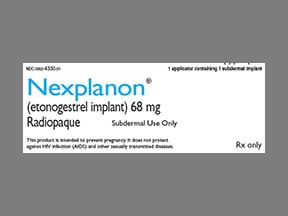Nexplanon is a limited distribution medication.

Nexplanon Coupons & Savings Card – Discount Prices from $1050.82
My prescription
Edit
68MG, Nexplanon (1 Implant)
Select pharmacy

Walmart
$1050.82
COUPON PRICE
Albertsons
$1071.12
COUPON PRICE
Walgreens
$1315.82
COUPON PRICENexplanon savings card
Show this card to your pharmacist
Walmart
$1050.82
BIN
ID
PCN
GRP
019876
LH1958319E
CHIPPO
LHX
Powered by
Related progestins prescriptions
Related progestins prescriptions
Price history for Nexplanon
1 Implant, 68MG
Average retail price for Nexplanon
Average SaveHealth price for Nexplanon
Our price history data is based on aggregated prescription data collected from participating pharmacies in America. Our prescription data updates daily to reflect the latest price changes. If you notice a missing data point, it means there wasn't sufficient data available to generate a monetary value for that date.
*Retail prices are based on pharmacy claims data, and may not be accurate when we don't have enough claims.
Nexplanon dosage forms
Dosage Quantity Price from Per unit 68MG 1 Implant $1050.82 $1050.82
| Dosage | Quantity | Price from | Per unit |
|---|---|---|---|
| 68MG | 1 Implant | $1050.82 | $1050.82 |
What are the downsides of Nexplanon?
Nexplanon, a contraceptive implant, may have several potential downsides. Some individuals may experience side effects such as irregular menstrual bleeding, headaches, weight gain, acne, and mood changes. There is also a risk of the implant migrating from its original insertion site, which could require surgical removal. Additionally, it does not protect against sexually transmitted infections. It's important for individuals to discuss their medical history and any concerns with a healthcare provider to determine if Nexplanon is a suitable option for them.
Does Nexplanon stop periods?
Nexplanon can affect menstrual bleeding patterns. Some individuals may experience lighter periods, irregular bleeding, or their periods may stop altogether while using Nexplanon. However, the effects can vary from person to person. It is important to discuss any concerns or changes in menstrual patterns with a healthcare provider.
Does Nexplanon cause weight gain?
Nexplanon, a type of hormonal contraceptive implant, may cause weight gain in some individuals. However, weight gain is not experienced by everyone and can vary from person to person. If there are concerns about weight changes while using Nexplanon, it is advisable to consult with a healthcare provider for personalized advice and management.
Do you still ovulate while on Nexplanon?
While using Nexplanon, ovulation is typically suppressed. Nexplanon is a hormonal contraceptive implant that releases etonogestrel, which primarily works by preventing ovulation. However, in some cases, ovulation may still occur, but the implant also thickens cervical mucus and alters the uterine lining to prevent pregnancy.
Why do people stop using NEXPLANON?
People may stop using NEXPLANON for various reasons, including experiencing side effects such as irregular bleeding, weight gain, mood changes, or headaches. Others may choose to discontinue it if they wish to become pregnant, switch to a different form of contraception, or if they have concerns about long-term hormonal use. Additionally, some may stop using it due to personal preference or lifestyle changes.
